Antibody data
- Antibody Data
- Antigen structure
- References [1]
- Comments [0]
- Validations
- Immunocytochemistry [2]
- Immunohistochemistry [5]
- Other assay [1]
Submit
Validation data
Reference
Comment
Report error
- Product number
- PA5-55070 - Provider product page

- Provider
- Invitrogen Antibodies
- Product name
- ADSS Polyclonal Antibody
- Antibody type
- Polyclonal
- Antigen
- Recombinant protein fragment
- Description
- Immunogen sequence: KLDGEIIPHI PANQEVLNKV EVQYKTLPGW NTDISNARAF KELPVNAQNY VRFIEDELQI PVKWIGVGKS RESM Highest antigen sequence identity to the following orthologs: Mouse - 96%, Rat - 96%.
- Reactivity
- Human
- Host
- Rabbit
- Isotype
- IgG
- Vial size
- 100 μL
- Concentration
- 0.1 mg/mL
- Storage
- Store at 4°C short term. For long term storage, store at -20°C, avoiding freeze/thaw cycles.
Submitted references Proteomic analysis of the effect of the polyphenol pentagalloyl glucose on proteins involved in neurodegenerative diseases in activated BV‑2 microglial cells.
Mendonca P, Taka E, Soliman KFA
Molecular medicine reports 2019 Aug;20(2):1736-1746
Molecular medicine reports 2019 Aug;20(2):1736-1746
No comments: Submit comment
Supportive validation
- Submitted by
- Invitrogen Antibodies (provider)
- Main image
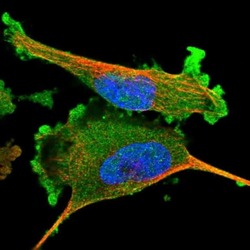
- Experimental details
- Immunofluorescent staining of ADSS in human cell line U-251 MG shows positivity in plasma membrane & cytoplasm. Samples were probed using an ADSS Polyclonal Antibody (Product # PA5-55070).
- Submitted by
- Invitrogen Antibodies (provider)
- Main image
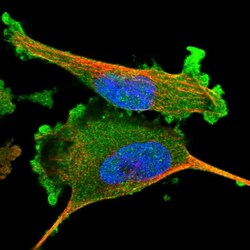
- Experimental details
- Immunofluorecent analysis of ADSS in human cell line U-251 MG using ADSS Polyclonal Antibody (Product # PA5-55070). Staining shows localization to plasma membrane and cytosol.
Supportive validation
- Submitted by
- Invitrogen Antibodies (provider)
- Main image
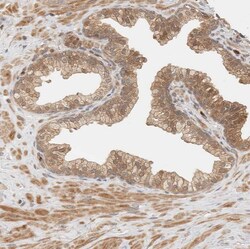
- Experimental details
- Immunohistochemical staining of ADSS in human prostate using ADSS Polyclonal Antibody (Product # PA5-55070) shows moderate cytoplasmic and membranous positivity in glandular cells.
- Submitted by
- Invitrogen Antibodies (provider)
- Main image
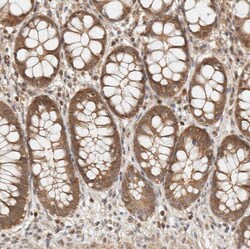
- Experimental details
- Immunohistochemical staining of ADSS in human rectum using ADSS Polyclonal Antibody (Product # PA5-55070) shows moderate to strong cytoplasmic positivity in glandular cells.
- Submitted by
- Invitrogen Antibodies (provider)
- Main image
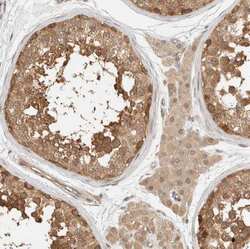
- Experimental details
- Immunohistochemical staining of ADSS in human testis using ADSS Polyclonal Antibody (Product # PA5-55070) shows moderate cytoplasmic positivity in cells in seminiferous ducts.
- Submitted by
- Invitrogen Antibodies (provider)
- Main image
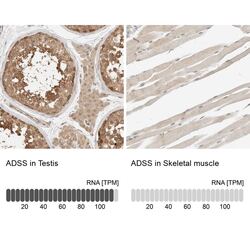
- Experimental details
- Immunohistochemical staining of ADSS in human testis and skeletal muscle tissues using ADSS Polyclonal Antibody (Product # PA5-55070). Corresponding ADSS RNA-seq data are presented for the same tissues.
- Submitted by
- Invitrogen Antibodies (provider)
- Main image
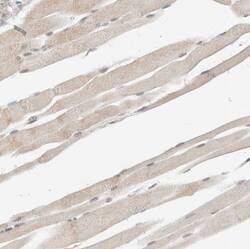
- Experimental details
- Immunohistochemical staining of ADSS in human skeletal muscle using ADSS Polyclonal Antibody (Product # PA5-55070) shows weak cytoplasmic positivity in myocytes.
Supportive validation
- Submitted by
- Invitrogen Antibodies (provider)
- Main image
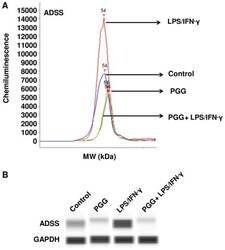
- Experimental details
- Figure 5. Effect of PGG on the expression of ADSS as determined by western analysis with automated capillary electrophoresis. (A) Graph presenting the chemiluminescence levels measured in the different treatments. (B) shows bands representing the protein expression in control (DMSO), PGG (25 uM), LPS/IFNgamma, and pretreated cells (PGG + LPS/IFNgamma) after 24 h of treatment (n=3). ADSS, adenylosuccinate synthetase isozyme 2; PPG, polyphenol pentagalloyl glucose (1,2,3,4,6-penta-O-galloyl-beta-D-glucose); LPS, lipopolysaccharide; IFNgamma, interferon gamma; MW, molecular weight.
 Explore
Explore Validate
Validate Learn
Learn Western blot
Western blot Immunocytochemistry
Immunocytochemistry